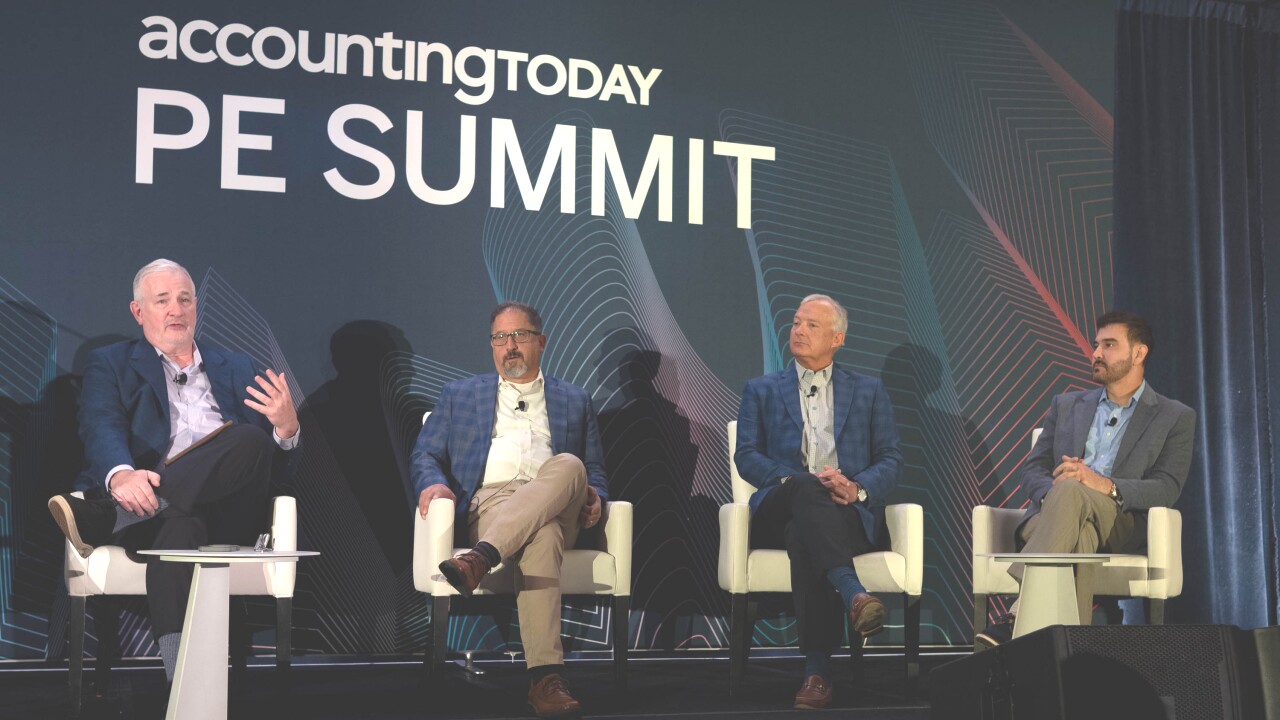The auditing profession is responding to the novel coronavirus pandemic by adjusting how it conducts audits, and that’s evident in the Center for Audit Quality, whose CEO, Julie Bell Lindsay, took over the leadership job at the organization just about a year ago when the priorities for the profession and the CAQ looked far different.
“I’ve been in this job for almost a year, and it’s been really fascinating,” she told Accounting Today. “One of the CAQ team members said to me the other day, ‘I bet you didn’t think you were going to have a pandemic in your first year.’ No, I did not. That’s for sure. It’s been fascinating to see how the profession has really pulled together.”
That has required a change in plans for the CAQ this year. “The plans I had coming into the year have kind of been thrown out the window with everything that’s happened,” said Lindsay.

The COVID-19 pandemic has created many challenges and uncertainties that have made auditing more difficult. “A lot of the audits were done by the time this pandemic hit in earnest because the fiscal year-end for a lot of companies in the U.S. is 12/31,” said Bell Lindsay. “Now we’re smack dab in the middle of first-quarter reporting for those 12/31 year-end companies. So you have that, plus you also have audits for companies with March 31 year ends. Then I think there’s another big group of companies with June 30 fiscal year ends. That’s the area where the profession is focusing on right now. There’s no question that there have been a lot of challenges.”
Many auditors have needed to work from home and away from their firms’ offices and their clients’ locations. But audit technology has advanced to the point where that isn’t so unusual anymore. “Public company auditors have already been operating in a virtual environment for many years,” said Bell Lindsay. “One of the things that most surprised me since I took this job is how auditors are using technology in many different ways. By combining that use of technology that already existed, particularly for the larger audit firms that are already working with multinational clients, across borders, having to deal with a digital environment, I think the profession adapted very quickly to the world that we now live in. Granted, everybody in the financial reporting system is now remote, so not only are the auditors remote, which was par for the course before, but the surprise is that you have board members, audit committees, company management, regulators, everybody is operating remotely. I do believe that the public company auditing profession quickly adapted themselves, but also served a key role in having the whole ecosystem continuing to move forward in this environment.”
The CAQ itself has been moving forward with several initiatives, including a
“It’s not really breaking any new ground, but really just reminding board members and company management that in this environment, where you have everybody operating virtually, misconduct can occur,” said Lindsay. “Most times you have very ethical people who want to do the right thing. I’ve seen not only in the profession, but in humanity that people are pulling together and trying to do the right thing, but you do have those who could take advantage of operating in a remote environment.”
The publication discusses the three sides of what the CAQ calls the “fraud triangle”: pressure, opportunity and rationalization.
“There’s a lot of pressure and a lot of opportunity and there could be rationalization,” said Bell Lindsay (pictured). “I know it’s hard because companies and board members have so much on their plate right now, but you can’t lose sight of culture and you can’t lose sight of ethics.”

The CAQ has been working with other organizations such as Financial Executives International, the Institute of Internal Auditors and the National Association of Corporate Directors on an Anti-Fraud Collaboration for nearly a decade, and the CAQ has been affiliated with the American Institute of CPAs ever since it was founded in 2007.
“One of the main things we do at the CAQ is to convene and collaborate with the stakeholders in the financial reporting ecosystem, to bring them together on critical issues that require us to act and potentially intervene,” said Bell Lindsay. “I would say coronavirus is a critical issue that requires action and intervention. I think we’ve done a really good job over the past month or so when everybody went remote to really be there for our members, to be there for other stakeholders and to serve as a convener and a collaborator.”
She wants to focus on bringing more talent into the auditing profession in the future. “I think there’s still this kind of stereotype of an auditor sitting in a room by him or herself with a calculator and a green eyeshade, and that’s not the way it is,” she said. “How technology is being used by auditors and the dynamic trusted advisor nature of auditing make it a really exciting career path.”
Last year, the CAQ partnered with an organization called Road Trip Nation, which has produced a documentary that’s scheduled to debut June 4 on PBS. “This one is going to be on auditors,” said Bell Lindsay. “It really presents the profession in a more accurate, real-time and on-the-ground light. It’s something that we’re really excited about. It’s hard for talent coming into the profession. There are so many areas that just seem so much more exciting, and auditing is exciting. Not many professions give you the opportunity to see as many industries and as many different types of companies as the auditing profession does.”
Audit firms are helping out with philanthropic support during the COVID-19 pandemic, she noted. “Firms have done a lot of things outside of their four walls for their communities and for other people impacted by the crisis,” said Bell Lindsay. “PwC’s foundation has contributed several million dollars to ensure that health care professionals have PPE, personal protective equipment, as well as communities that have been hard hit — ‘hot spots’ so to speak — have food and resources. Crowe, which is another one of our governing board member firms, has a free pandemic response app. Essentially, it is a centralized resource on all news and input or information relating to the pandemic, like government mandates, closures, virus cases in different areas, in an effort to help organizations promote and prioritize their employees’ health and safety.”
While some firms have been laying off and furloughing staff, senior partners and leaders at some firms are taking pay cuts so layoffs will be a last resort. “That only amplifies that they are trying to do the right thing for their own people,” said Bell Lindsay.
The one thing that firms want to avoid during the pandemic is sacrificing the quality of the audits and reviews they perform on financial statements, especially when it comes to their clients’ quarterly earnings. They want to make sure they do their jobs according to the standards.
The Securities and Exchange Commission has been providing some more leeway to public companies and their auditors, pushing back the deadlines for filing quarterly financial statements by 45 days and voting to exempt smaller public companies from attestations of their internal controls (see our stories
“On the delay that the SEC has provided, I think that is clearly a recognition of some of the analysis, even in a review, because an auditor’s level of engagement and participation in a quarterly review is very, very different and not nearly as robust as a pure audit at the end of the year,” said Bell Lindsay. “But even in the review cycle, when you have things like valuations and goodwill analyses, that’s going to take some additional time. I think the SEC delay was a recognition that it takes additional time, not only for company management, but also for the auditor. I think that development was very appreciated on both sides.”
However, she hasn’t seen many public companies taking advantage of the delay so far. As for exempting large public companies from auditor attestations of internal controls under Section 404(b) of the Sarbanes-Oxley Act, Bell Lindsay believes it won’t apply to a large population of companies, only to an estimated 500 companies with annual revenues over $100 million. Even though the CAQ has objected to such proposals in the past, Bell Lindsay acknowledged why the SEC may have decided to do it based on a cost benefit analysis.
“The CAQ and the auditing profession have historically been opposed to that,” she said. “I will say that I think the SEC really looked at costs and benefits. At least that was the premise. Our view is that a lot of the time some of the misstatements and restatements that you have because of internal control deficiencies are at smaller companies. The data is there to support that. Having said that, I do believe that the SEC was looking at the cost benefit analysis, and they obviously decided to move forward based on that.”
While the SOX 404 requirements were put in place for a reason, she pointed out that auditors will still be involved in periodically examining internal controls over financial reporting. “I think it’s undoubtedly served the markets well to have the auditor looking, as well as management, at internal controls,” she said. “An auditor does it on an annual basis and management is required to certify on a quarterly basis. But even then the auditor does have an unlimited amount of responsibility on a quarterly basis to look at internal controls. Certainly you increase the risk that there could be issues that develop over time that turn into the need for a restatement. But for most of the bigger companies, nothing has changed. Biotech for a very long time has been pushing for something like this, and it’s really the smaller companies that are impacted.”
Early this month, she noted, SEC chairman Jay Clayton and SEC Corporation Finance director William Hindman issued a
“Investors are looking in this environment for forward-looking information,” said Bell Lindsay. “Even before the pandemic, investors were looking at non-GAAP information. They’re looking at KPIs, or key performance indicators. ESG [environmental, social and governance reporting] is a huge area. They’re looking at all of this information outside of the historical financial statements and making capital allocation decisions. I think it’s very important to note that the auditor plays a very limited role in all of that information. I think it’s also very important to note that the auditor is a key gatekeeper when it comes to reliability of financial information. Really expanding the role of auditor is something that we’re going to be talking about quite a bit and focusing on this year, and we’re starting to see things moving in that direction.”





